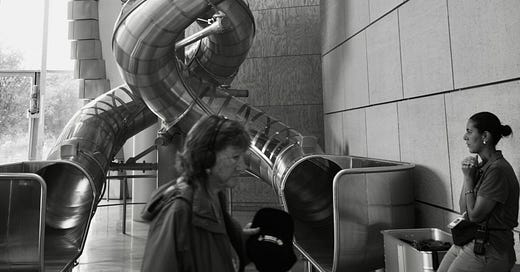Friday 21 June, 2024
Helter-skelter
The helical chutes inside Frank Gehry’s Tower in the Luma Arles arts centre, photographed yesterday. Believe it or not, perfectly sensible adults come hurtling down these.
The view from the top of the tower is terrific, though. First time I’ve ever had an aerial view of Arles, a city I love.
Quote of the Day
”Sometimes it is the body which is the first to surrender to old age, sometimes the soul.”
Michel de Montaigne
Musical alternative to the morning’s radio news
Keith Richards and Norah Jones | Love Hurts
Long Read of the Day
Watergate: a reprise
Lovely post by Heather Cox Richardson on the last time the US had a president who was totally unfit for office.
Early in the morning on June 17, 1972, Frank Wills, a 24-year-old security guard at the Watergate Office Building in Washington, D.C., noticed that a door lock had been taped open. He ripped off the tape and closed the door, but when he went on the next round, he found the door taped open again. He called the police, who found five burglars in the Democratic National Committee headquarters located in the building.
And so it began…
She’s one of the best historians writing in the US at the moment. And has been a Substack star since, well, forever.
My commonplace booklet
LLMs as judges
Now this is really weird. Its author, Adam Unikowsky, is a partner in a fancy American law firm where he specialises in Appellate and Supreme Court cases. He previously served as a Judicial Law Clerk to former Justice Antonin Scalia and before that clerked for Judge Douglas Ginsberg at the U.S. Courts of Appeals for the D.C. Circuit. So he’s not your average AI booster.
He recently tried an experiment:
I downloaded the briefs in every Supreme Court merits case that has been decided so far this Term, inputted them into Claude 3 Opus (the best version of Claude), and then asked a few follow-up questions. (Although I used Claude for this exercise, one would likely get similar results with GPT-4.)
The results were otherworldly. Claude is fully capable of acting as a Supreme Court Justice right now. When used as a law clerk, Claude is easily as insightful and accurate as human clerks, while towering over humans in efficiency.
Let’s start with the easiest thing I asked Claude to do: adjudicate Supreme Court cases. Claude consistently decides cases correctly. When it gets the case “wrong”—meaning, decides it differently from how the Supreme Court decided it—its disposition is invariably reasonable.
For example, Thursday and Friday last week, the Supreme Court decided six cases: United States Trustee v. John Q. Hammons Fall 2006, LLC; Campus-Chaves v. Garland; Garland v. Cargill; FDA v. Alliance for Hippocratic Medicine; Starbucks v. McKinney; and Vidal v. Elster. Claude nailed five out of six, missing only Campos-Chaves, in which it took the dissenters’ side of a 5-4 opinion, which is hardly “wrong.”
I’m not a lawyer, so can’t really judge. But the summary judgments produced by Claude looked plausible.
Not sure what this means. Maybe it’s just that legal reasoning is particularly amenable to the ways LLMs work. But this seems a bigger deal than the stories about his the models can ace the tests set for entrants to some professions.




